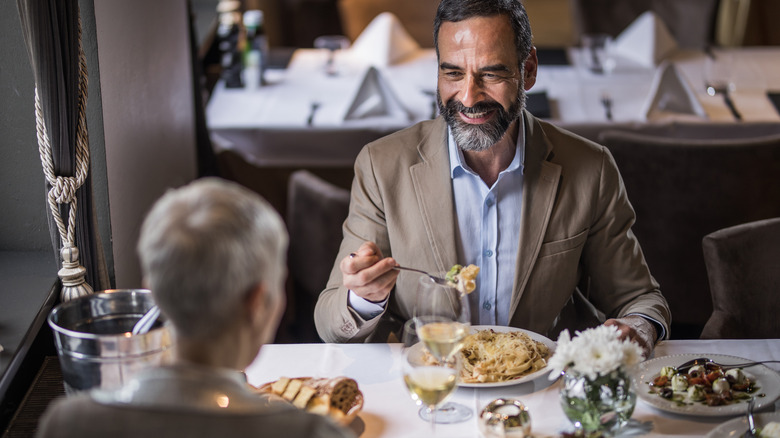The Fancy Dinner Rule You May Not Realize You're Breaking
There's nothing more exciting than a luxurious night out, dressed to the nines, for an unforgettable fine dining experience. From the menu to the decor, every detail is exquisitely planned to deliver an unforgettable night of indulgence.
But, according to the Emily Post Institute, a North American-based source for etiquette advice, there's one rule that most people break: Eating slowly and taking small bites, honoring the eating pace of other diners. Yes, it may sound easy, but you'll be surprised by how many people eat too quickly, disregarding proper dining etiquette.
The art of slowing down at mealtime is a sign of respect and good manners. Pacing yourself with others allows the dinner and the conversation to flow naturally and ensures you're not stuffing your face with large portions that don't fit into your mouth.
Taking smaller bites and chewing your food slowly also has an incredible impact on how you digest your food, too. Plus, slowing down allows you to truly savor the flavor and aromas of your food, adding to the overall dining experience.
Follow along as we dive into the science and psychology of slow eating, including practical tips and tricks to help you savor every bite and enjoy the evening. We'll explore everything from how to pace yourself, take breaks, and enjoy conversation while at dinner.
The origins of slow eating as dining etiquette
The origins of slow eating as dining etiquette date back centuries to a time when manners were highly valued and considered essential to social interaction. George Washington's "Rules of Civility & Decent Behavior," a set of guidelines that emphasized propriety and respect, included several rules related to mealtime behaviors — including one that called for slow and deliberate eating.
Washington's 97th rule advised, "Put not another bit into your Mouth til the former be Swallowed [l]et not your Morsels be too big for the Gowls." This may seem like common sense today, but in Washington's time, it was a crucial component of dining etiquette. The reason for this, and many other mealtime rules, is simple: To make others feel comfortable.
Watching someone devour a huge chunk of food or talk with their mouth full is unappealing to most people, making them feel uneasy or even disgusted. By taking care to eat slowly and deliberately, we show respect for those around us and make the dining experience more enjoyable for everyone.
Plus, as mentioned, taking small bites and savoring each morsel is a way to force yourself to savor the flavors and slow down to enjoy the conversation. Worried you won't finish everything on your plate if you take it slow? Luckily it's not considered rude to leave food on your plate, so don't worry about having to finish fast or even at all.
How to pace yourself at dinner
Mastering the art of pacing yourself at a fancy dinner party or restaurant can be difficult, especially if you're used to rushing meals at your desk as you answer emails. However, if you want to impress your dinner companions and show that you know how to handle an evening of fancy dining, you'll need to learn how to slow down.
You can do this by first embracing the idea of savoring your meal. "People get the most pleasure from their food when they take the time to savor it fully," says UC Davis sensory scientist Michael O'Mahony (via the University of California). So chew each bite slowly and deliberately, taking the time to truly experience the flavors and textures of every dish.
If you have trouble slowing down, try focusing on identifying the flavors within each bite. Do you pick up on the hint of black pepper in that red wine reduction sauce or the inclusion of a dash of cinnamon in those oven-baked pork chops?
As you enjoy your meal, take small breaks. Take a sip of water, lean back in your chair, and engage in conversation with your fellow diners. This will not only help you pace yourself but also allow you to fully engage in the social aspect of the meal. Be mindful and present, and you won't likely find yourself racing to finish everything on your plate. Just don't forget to save room for dessert; there's always room for dessert.


